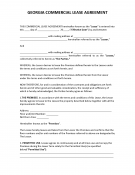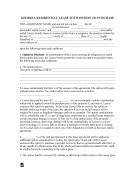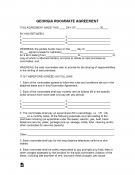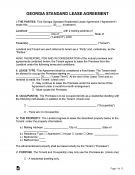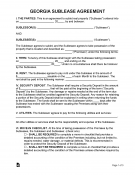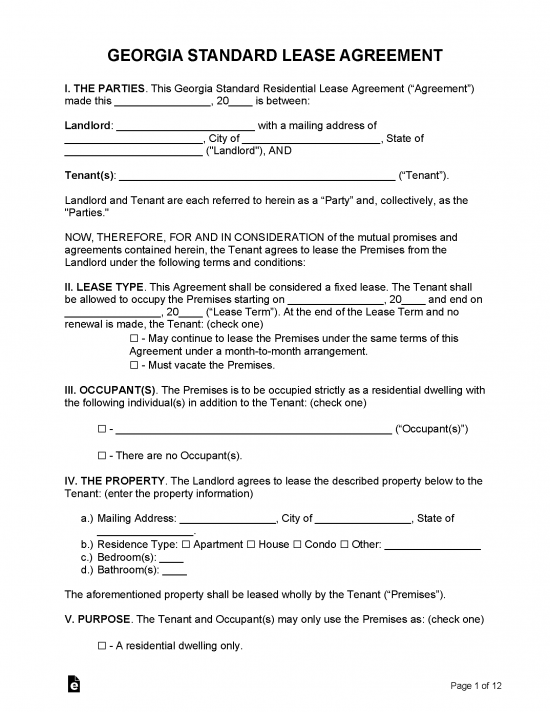Georgia lease agreements are contracts between a landlord and tenant that govern a tenancy in a property owned by a landlord. The lease agreement will contain the amount of rent and the terms of payment, the duties of the landlord, and other attributes particular to the property, such as utility arrangements. Lease agreements can help avoid disagreements between landlords and tenants by providing each party with a clear idea of what is expected.
Contents
- Georgia Lease Agreements: By Type (6)
- Landlord-Tenant Laws
- Handbooks and Guides
By Type (6)
- Commercial Lease Agreement
- Month-to-Month Lease Agreement
- Rent-to-Own Lease Agreement
- Roommate Lease Agreement
- Standard Lease Agreement
- Sublease Agreement
Download: Adobe PDF, MS Word, Rich Text Format
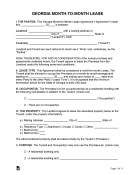 Month-to-Month Lease Agreement
Month-to-Month Lease Agreement
Download: Adobe PDF, MS Word, Rich Text Format
Download: Adobe PDF, MS Word, Rich Text Format
Download: Adobe PDF, MS Word, Rich Text Format
Download: Adobe PDF, MS Word, Rich Text Format
Download: Adobe PDF, MS Word, Rich Text Format
Landlord-Tenant Laws
Statutes – Title 44, Chapter 7 (Landlord and Tenant)
Required Disclosures (4)
Flood Disclosure – For properties that have experienced flooding at least three (3) or more times in the five (5) years before signing the lease agreement, the landlord must inform the tenant and may do so with this form (§ 44-7-20).
Identification – The landlord should provide information to the tenant about who may be eligible to access the property, including all managers or agents that the landlord may rely on (§ 44-7-3).
Move-in / Move-out Inspection Form – This form offers a before-and-after comparison of the condition of various parts of a unit (§ 44-7-33).
Lead-Based Paint Disclosure – Per federal law if the residential dwelling was built prior to 1978 this document must be attached to the rental contract.
Security Deposit Laws
Maximum Amount ($)
There is no statutory maximum on security deposits in Georgia.
Returning to Tenant
The landlord must return the entire security deposit to the tenant within one (1) month after either the termination of the lease or the surrender of the premises, whichever comes first. The landlord may retain a portion of the security deposit to cover the cost of addressing damage done to the property during the tenancy, but may not retain any of the security deposit for fixes that are the result of wear and tear. If the landlord chooses to retain all or a portion of the security deposit, he or she must notify the tenant and include an itemization of deductions as provided here. If the tenant does not respond within ninety (90) days of the landlord mailing the notification, the tenant will be deemed to have assented and the items become property of the landlord (§ 44-7-34).
When is Rent Due? (grace period)
Landlords and tenants may decide on a time and place at which rent is due in the rental agreement. Georgia law does not establish a grace period.
Eviction Notice (non-payment)
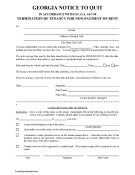 Notice to Pay or Quit – If a tenant does not pay rent on the date agreed upon, a landlord has the right to demand that the tenant surrender possession using this form on a date specified. If the tenant fails to do so, the landlord may go before a superior court to begin proceedings to terminate the lease. (§ 44-7-50)
Notice to Pay or Quit – If a tenant does not pay rent on the date agreed upon, a landlord has the right to demand that the tenant surrender possession using this form on a date specified. If the tenant fails to do so, the landlord may go before a superior court to begin proceedings to terminate the lease. (§ 44-7-50)
Download: Adobe PDF
Maximum Fees ($)
Late Rent Penalties
Georgia law does not limit how much landlords may charge as a late fee. However, a late fee, if a landlord chooses to impose one, should be specified in the rental agreement and should be reasonable, meaning it’s connected to costs a landlord might bear as a result of the rent being delivered late.
NSF Checks
A landlord may charge up to $30 or five (5) percent of the value of the check, whichever is greater, if a rent check is delivered with insufficient funds in the account to which it is linked (§ 13-6-15).
Tenant’s Unclaimed Property
If the tenant leaves personal property behind following eviction proceedings, the landlord may remove the items and maintain them on some property owned by the landlord. However, the landlord does not have a duty of care to the tenant regarding this property, and once the writ is executed, the property is deemed abandoned (§ 44-7-55).
